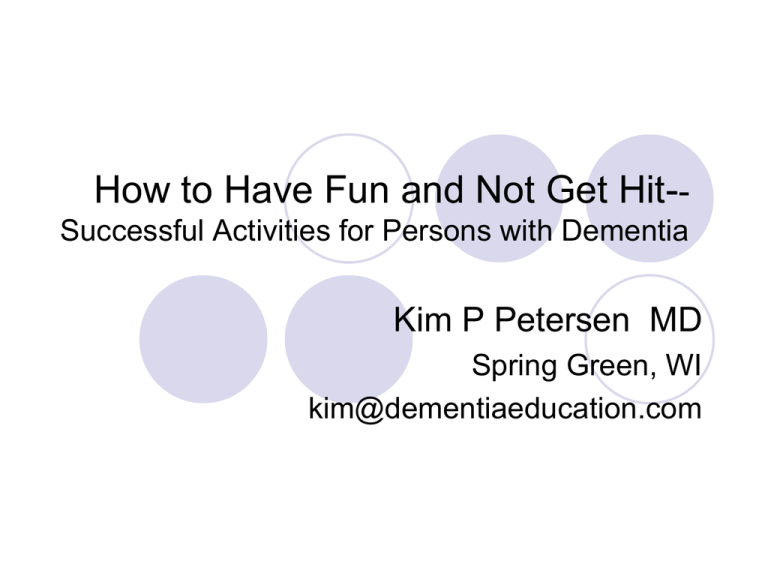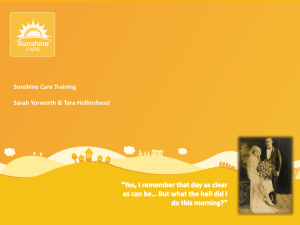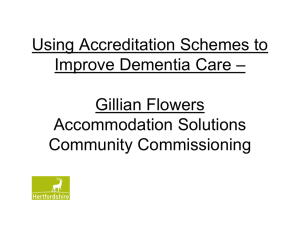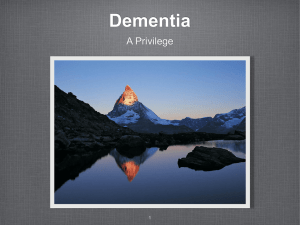How to Have Fun and Not Get Hit--Successful
advertisement

How to Have Fun and Not Get Hit-Successful Activities for Persons with Dementia Kim P Petersen MD Spring Green, WI kim@dementiaeducation.com Is This How You Feel Working with Dementia Residents? How to Have Fun Activities with Persons with Dementia FIRST--Start with Understanding the Person with Dementia Personhood A feeling, human being who is is not limited to memory, problem solving, or ability to perform activities of daily living A person with a disability, not a terminal illness A person who is valued and respected for who they have been and who they are at this moment A person whom we must learn to understand and know. Personhood Denied Consequences of denying personhood: Cognitive and Functional Decline Disability Victimization (AD victim) Dehumanization Isolation and Alienation Personhood Denied Terror Depression Non-support Shattered life Personhood Denied US Sound of Mind Contributing Whole Cognizant THEM Damaged Deficient Without Value No Contribution Treachery & deception Disempowerment Infantilization Intimidation Labeling Stigmatization Outpacing Invalidation Banishment Objectification Ignoring Imposition Withholding Accusation Disruption Mockery Disparagement Personhood Identity Attachment LOVE Occupation Comfort Inclusion Tom Kitwood, Dementia Reconsidered: The Person Comes First SECOND—Understand Their Pre-Dementia Intelligences Intelligence Howard Gardner’s Definition: Verbal Mathematical/ Logical Visual-Spatial Musical Motor Naturalist Spiritual/Existential Interpersonal Emotional Intrapersonal Intelligence (Daniel Goleman) You May Need to Get This Background Information from the Family Verbal Intelligence Likes to read, write, do crosswords Enjoys conversation, public speaking Enjoys puns, jokes, wordplay Loves to tell stories Enjoyed English, social studies, history, foreign language, speech, drama, forensics in school Mathematical/ Logical Intelligence Good with numbers Enjoys playing cards Likes sports statistics Follows the stock market Likes to find patterns, logical sequences Enjoyed math, science, law classes Visual-Spatial Intelligence Is artistic Likes to draw or paint Enjoys sewing, knitting, woodworking Good at home decorating and repair- is “handy” Likes color and design Likes to take photos Enjoyed art, home ecc, mechanical arts classes Motor Intelligence Enjoys playing sports Likes to dance Is graceful and coordinated Enjoys physical exercise Likes working with hands Is mechanical Enjoyed phys ed, home ec, mechanical arts classes Musical Intelligence Likes to sing or play a musical instrument Enjoys listening to music Knows a lot about a musical era Enjoyed band, chorus, orchestra, dances Naturalist Intelligence Loves the natural world: animals, plants, nature Would rather be out of doors Cares for pets, birds, the environment Likes to garden Enjoyed science, botany, biology, ecology, geology classes Spiritual/ Existential Intelligence Is religious or spiritual Practices meditation Contemplates “the big questions” Enjoyed philosophy and religion classes Emotional Intelligence Is self-reflective and insightful Good at interpreting personal needs and those of others Is a “people person” Good listener, empathetic Fun to be around/ good sense of humor Enjoyed psychology classes, drama, social events Emotional Intelligence- Humor Loves jokes, wordplay Isn’t afraid of looking silly Enjoys comedies, funny books Sees life’s silliness and “fabulous realities” Uses humor in difficult situations, laughs in the face of adversity Sought out by other people for sunny outlook on life Aging Underwear Assessing Cognitive Strengths of Persons with Mild-Moderate Dementia What type of jobs have you had? What skills have you developed for your job? Tell me about your schooling. Did you have a favorite class or classes? Did you have any subjects that you didn’t like at all? What are your hobbies? What keeps you busy now? What have you always wanted to learn or do? When do you feel happiest, most satisfied, creative? Improve YOUR Communication Skills General Communication Principles Set the Stage Quiet environment Even bright lighting Avoid strong backlights Reduce clutter and distraction Turn off the television! Disasters portrayed on tv may seem real and immediate General Communication Principles Earn attention Make eye contact Use touch, if appropriate Sit if the person is sitting Be at the same level Smile genuinely Greet the person Use the person’s preferred name Introduce yourself Be willing to come back, if this isn’t a good time General Communication Principles Vocal Quality Lower pitch Calm Slow down Don’t use Elderspeak Sing-songy voice, childish intonation and language, “Imperial we” If a person is hard of hearing, consider using a pocket talker or other assistive device A loud voice may be perceived as angry or cross General Communication Principles Non-Verbal Cues “Center” and collect yourself, so your body language will be calm, positive, open Smile with the eyes, as well as the mouthmean it! Open, non-threatening stance, hands relaxed, visible Be aware of each person’s personal space comfort zone Keep Language Simple One step at a time Add descriptors and gestures: Please sit down in this chair right here This blue chair This blue rocking chair Don’t argue or confront NEVER SAY NO! Positive Language Let’s explore the garden. I’m sorry, I must have bumped the table and spilled your juice. Let’s us early-birds have some coffee. Let’s go freshen up. Negative Language Don’t go out to the street! Oops, you spilled your juice all over! You can’t get up nowit’s 4 a.m. I need to clean you up, you had an accident. The Art of Questions 1. Who is this? • Open-ended question 2. Is this a picture of John Wayne? • Question that gives the answer 3. Gee, John Wayne looks serious here, don’t you think? • Make a commentary 4. How do you feel when you see this picture of John Wayne? • Creative question, with no right or wrong answer Responding “Give me the ……..the…..you know…” It must be really frustrating when you can’t find the word you’re looking for. “I was in the Navy on an aircraft carrier…” What an interesting story– I love to hear you talk about being in the navy! “I want to go home…I want to go home..” I wish I could take you home Responding “Please don’t leave me, stay here…” I hate to leave, but I’ll look forward to seeing you tomorrow. “Nobody loves me or wants me…” I cherish your friendship, love. “I don’t want to go back in…let’s stay outside.” I had so much fun watching the squirrels play in the yard. Thank you for sharing this time with me. THIRD—Use Tested Activities for Persons with Dementia Reminiscence and “Life Review” Process, not product “Just do it!” -- Don’t worry about grammar, spelling, mechanics “Life Story Books” TR- Bios (Therapeutic/ Restorative Biographies- Gene Cohen) “Making Memories Together” game- GENCO GAMES TimeSlips- Creative Storytelling Project Developed by Anne Basting, PhD, the TimeSlips project has generated hundreds of stories and plays. The creative processes promotes communication, connection and joy in elders who are living with dementing illnesses. www.TimeSlips.org Music Therapy in Dementia Meta-analysis of Study Results Persons with dementia can continue participating in structured music activities into late stage Instrument playing and dance/ movement are most preferred live music activities Singing participation declines in late stage dementia Modeling of expected responses helps to maintain participation Music Therapy in Dementia Meta-analysis of Study Results Individual or small groups (3 - 5) are optimum Social and emotional skills and communication are enhanced Music can enhance cognitive skills such as memory Information presented in a song context enhances recall and recognition Effective alternative to medication for behavior management Music Therapy Resources Alicia Clair, Therapeutic Uses of Music with Older Adults David Aldridge, ed. Music Therapy in Dementia Care Oliver Sacks, Musicophilia: Tales of Music and the Brain Here’s A Neat Idea !! Adding a “Spark of Life” to Your Programs Jane Verity- Dementia Care Australia www.DementiaCareAustralia.com Goals for Participants: To have their self-esteem boosted To be creative To be the leader To express themselves in their own unique way Program called “The Sunshine Club” Adding a “Spark of Life” to Your Programs Rules of the Sunshine Club program : One room Two facilitators Three club levels Everything is right Nothing is wrong Sunshine Club Format Minimum of 1.5 hours Inviting Ritual: Hello. I’m so pleased to invite you to come to our Sunshine Club meeting! Walk with person to club room Greeting and welcoming ritual Hi George, I’m so glad you’re here. Beginning ritual May be a song “You Are My Sunshine,” motor activity, snack Sunshine Club Format Middle Theme – May be seasonal Potential Themes, written on the back of a game: Affirmations Life wisdoms Proverbs Jokes “Did you know?” Information, not quizzes Nursery rhymes, when appropriate Use black writing on a white background Upper and lower case letters with serifs Large print: minimum 26 Bold Sunshine Club Format Ending Ritual Recap special moments from the day Sing a song- “Good night ladies” Thank each person for coming Promise to meet again on the next scheduled day “We’ll meet again on Thursday.” Club Levels Club 1- Those needing highly focusing activities 4 – 6 members Stimulation through use of large, colorful moving objects May use giant balloons, dice, parachutes, flags Later stage dementia persons Communicate primarily non-verbally Can concentrate for a few minutes when attention is focused on someone else Can contribute to the group with smiles, caring for others, expressive movement or sounds, touch, eye contact Club Levels Club 2- Those needing focusing activities: 6 – 8 members Uses stimulation through a mix of verbal communication and large, colorful moving objects. Middle stage dementia persons: Can respond to and initiate conversation Can express themselves verbally when given time Can concentrate for up to 15 minutes Club Levels Club 3- Those needing least focusing activities: 8 members Stimulation through use of objects and verbal communication Sharing thoughts, feelings, life experiences and wisdom Choices often made by members themselves Early stage dementia persons Initiates spontaneous verbal conversation Can concentrate for 15 minutes of longer Can verbally validate and support one another Sample Club 3 Activity Bring in a bunch of old kitchen and workshop tools Ask each participant to choose one Ask: “What do you think of when you see this old bit and brace/ meat grinder/ rug beater?” Encourage everyone to share their ideas. Allow the conversation to drift– you don’t have a “plan” you need to follow Sample Club 2 Activity: Collaboration Tree of life game Draw a large tree trunk on a poster Make brightly colored autumn leaves out of cardboard Put a number 1 – 6 on the front of each leaf In large print, type a proverb on the back Have each participant roll the dice and take a leaf with that number on it Ask the participant to read the proverb on the back Ask: “What does this make you think of? Clap and have the participant put the leaf on the tree Sensory Stimulation- All 5 senses Tactile toys Quilts/ fabric Bubble pipe Scarves Balloons Fountains, envirascapes Favorite perfumes/ aftershave Musical Instruments to play Sample Club 1 Activities Greeting or ending ritual with large balloon Theme: First snowfall Gather cold weather items: mittens, scarf, longjohns, hockey jersey, ice scraper, earmuffs… Fill a (new) wheelbarrow with Styrofoam balls, hiding the winter items underneath the balls Have each participant dig in the wheelbarrow, find and item and do with it what they will. Wear it Comment on it– Ask “What do you think when you see these earmuffs? Praise each participant Other Ideas for Late-Stage Dementia Activities Montessori Based Activities for LateStage Dementia Residents Activities to maintain or regain tactile sensation, auditory, temperature and scent discrimination Match the smell of an orange with the orange itself, eat the orange or drink orange juice Sort sandpaper-covered blocks according to the coarseness of the sandpaper, from roughest to smoothest Scooping activities: using a spoon to transfer ping pong balls from a plate into the wells of a muffin tin Creative Adaptations for Persons with Severe Disability of Dementia Seek non-verbal creative tasks music, art, movement Procedural memory often remains for most of the dementia journey e.g. the motions for knitting, sanding a wooden piece Break task into small component parts e.g. sorting fabric by color for quilt pieces Remember: process, not product Adaptations of activities for persons with severe disabilities from dementia challenge your creativity! Reminiscence Therapy for Behavior Management Bath-time reluctance Old-fashioned apron Reminisce about Saturday night bath routine Peanut butter sandwich Getting dressed up to go out on a date or to a dance Aromatherapy- favorite moisturizer, cologne or aftershave I want to go home- My mother’s waiting for me Draw me a picture of your favorite room or place at home Look at Life Story Book Agitated Behavior- Use large muscle groups Tearing sheets and rolling bandages Sanding wood blocks Polishing candle sticks, wood tabletops Rummaging Sort “quilt fabric” by color and pattern Put nuts onto large bolts Handbag rummage Sorting socks, baby clothes sprinkled with baby powder Collaboration-Working Together “Life savers” Fanny pack Grocery/ hardware store list Hankies/ scarves to fold Peppermints Jewelry to sort Hand lotion Bandana Stuffed animal Collaboration- Working Together Job Box Toys to sand Fabric for bandages Candlestick to polish Old milking machine Ledger books/ grade books/ restaurant order pads Cross stitch hoops Large knitting needles, crochet hooks Old post cards to sort Fishing bobbers to sort Soda bottle with birdseed/ objects to find. Multi-Sensory Stimulation Create a Spa: Decorate the room like a resort with palm trees, umbrellas, beach posters, etc. Facials, make-up, manicures and pedicures Hair care Massage and aromatherapy Soothing music or environmental sounds Juice bar Do “Color profiles” Take and develop photos of persons after their “Make-Over” Exercise- yoga, tai chi, etc. Life Story Book Involve many family members in gathering mementos, pictures, etc. Many facilities and ADCs request that a Life Story Book be made when the person moves in or joins the group Use a three-ring binder and plastic sleeves File folders make durable pages for pictures Use copies of precious pictures May also make a Life Story box with 3- Spirituality Beloved religious items: Bible, rosary, Koran, Menorah Magazines from faith organizations Sacred music Designated place for meditation Outside meditation garden Humor and Play Early Stage dementia persons may be fighting to keep up a façade of control. May respond negatively to games that seem “childish” or “too easy.” Facilitator needs to use a sensitive, playful approach Humor and Play Middle and Later Stage dementia persons are letting go of past/future and living in the “here and now.” Often lose their inhibitions “Blossom” through play When play is presented in a spirit of fun, love and respect, people don’t feel demeaned. Play Support “Play” Behavior: Play doh, fingerpaints, silly string, puppets, stuffed animals, mud pile Creative Dramatics, Make-Believe, Charades: Make a collection of silly hats, clown noses, Groucho glasses Funny Board or Basket: Laminate cartoons, amusing pictures and funny sayings for a bulletin board or laugh basket Humor Everyday Funny Clothes Wear amusing buttons, vests, jewelry Kids and Animals Share funny children’s books: Alexander and the Terrible, Horrible, No Good, Very Bad Day- Viorst; Wilfrid Gordon McDonald Partridge- Mem Fox Bring in baby animals, pets Activities for Smiles and Laughs Funny Videos from Years Ago I Love Lucy, Milton Berle, Red Skelton Funny Videos for Children Beethoven, Chitty Chitty Bang Bang, Baby Einstein- Animals in Your Yard, Animals in Nature, Discovering Water, etc. Therapeutic clowns BurmaShave Signs Henry the Eighth Said Farmer Brown Sure Had Trouble Who’s Bald on Top Short-Term Wives “Wish I Could Long-Term Rotate the Crop” Stubble Older Than Dirt Head light dimmer switches on the floor? Using hand signals for cars without turn signals? Blackjack chewing gum Wax coke-shaped bottles with sugar water Candy cigarettes Telephone numbers with a word prefix Metal ice trays with a lever Mimeograph paper Blue flash bulbs Roller skate keys Wash tub wringers Newsreels before the movie How Not to Get Hit Triggers for dementia behavior are the key Prevention ( or reduction) of behavior works best Environmental Triggers Relocation Architectural maze Uncomfortable environment: (too hot/ cold, uncomfortable seating) Noise Hubbub Sensory stimulation: over or under Inadequate lighting cues Reflective surfaces Varied flooring surfaces Physical/ Psychosocial Triggers Pain Illness: UTI, MI, CVA, Dental problems, etc. Medications Disruption of circadian rhythms Depression Boredom Pre-morbid personality Interaction with peers Depressed caregiver Caregiver Interactions Lack of knowledge about dementia You need to know what type of dementia the person has Remember—it’s the disease, not the person, that is in control Lack of knowledge about the person Really know the person and what interests them We all need to “do” things Having meaningful days Lessens anxiety Helps keep emotions in balance Increases feelings of comfort & belonging Reduces behaviors Caregiver Interactions Carried-over emotions from personal life How’s Your day going? Hurry The Tortoise ALWAYS wins Communication failures Final Thoughts Persons with dementia are just the same as You & Me EXCEPT their brains are devastated by a disease that destroys brain cells & connections and causes their behavior They need (and deserve) our empathy & love The End of the Story…









